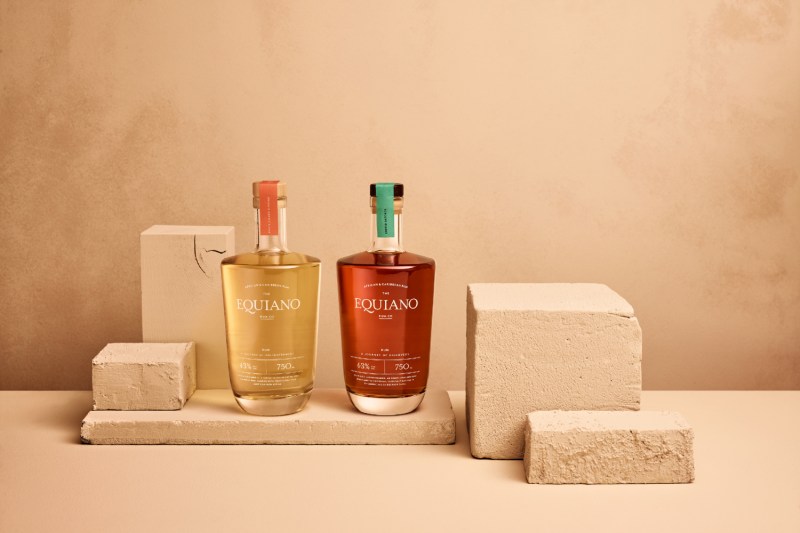Rum has a long and contentious history, built upon the backs of enslaved and marginalized communities. The Equiano Rum Company, which bills itself as the planet’s first African-Caribbean rum outfit, is out to decolonize the industry and make some mean spirits en route.
Related Reading
- Best Rum to Enjoy Neat
- Brands Giving Back: Santa Teresa Rum
- Brands Giving Back: Sierra Nevada Brewing Company
A big way in which Equiano is living up to its manifesto is by giving back to the community. Specifically, by putting its money where its mouth is and donating to organizations that have long battled oppression and slave labor, major pillars of the early rum trade. Most notably, the brand has teamed up with Anti-Slavery International, the oldest human rights organization in the world, founded in 1839.

“The rum industry is several hundred years old so, like many industries of the same day, it has a challenging history,” says Aaisha Dadral, Co-Founder and Brand & Marketing Director of Equiano. “At Equiano, we acknowledge that history is a motivator for change — whether that’s through reclaiming the narrative or being a proudly, globally diverse team, we focus on telling the next part of the story.”
For context, rum is deeply entangled in the slave trade, essentially shadowing its historical course from Africa to the Americas by way of the Caribbean. While much has changed since rum’s formative era, a lot of the baggage remains, from social and environmental exploitation to lack of diversity. Rum remains a white guy’s arena, at least in terms of ownership and accessibility. But those winds seem to be shifting.
Equiano has pledged to contribute $2 of every bottle of its rum sold to the cause. Dadral says that, to date, that equates to $14,000 to the organization and another $16,500 committed to content creation, marketing, and charity messaging. “Our grants have supported projects across Senegal, Tanzania, Mauritania, and Niger,” she adds. There is no specific target goal and the brand will continue to support the organization in 2022.
“Going beyond the pour was an intrinsic part of the identity of Equiano before we had a name or a liquid,” she continues. “Collectively, we truly believe in the power of good business to balance the scales and challenge the status quo so we’re incredibly proud of the work we’re doing alongside their [Anti-Slavery International’s] team.”
The Equiano name refers to one Olaudah Equiano, a writer and abolitionist who was kidnapped and sold into slavery in the mid-18th century. He managed to sling rum on the side, ultimately saving enough money to buy his freedom. He went on to be a huge voice in the anti-slave trade movement, working with the Sons of Africa in England and ultimately publishing a very telling and momentum-building memoir.
“The name that adorns our bottle and being reminded of our namesake daily makes it an easy focus,” Dadral says. “With a co-founder like Ian Burrell, who’s turned the industry on its head in many ways for the last two decades, it’s no wonder we’re challenging several things about both the rum industry and the beliefs spirits fans hold about rum.”

Equiano launched as and remains a BIPOC-run business, with Amanda Kakembo and Oli Bartlam joining Dadral and Burrell at the helm. Prior to this enterprise, Dadral worked high-profile marketing gigs for lauded record labels like Island and Mercury/def Jam Records. She founded her own studio, crave., in 2013 before launching Equiano in 2019, where she remains the majority shareholder.
Presently, Equiano offers an original rum and a light option. The spirits are sourced from Barbados and Mauritius, meaning a true hybrid spirit made from molasses spanning two hemispheres. Dadral says there may be some limited releases and special blends released in the near future, along with more collaborations with community-based organizations. Brand growth, sure, including even more visibility and availability in the states, but also sticking with the Equiano way and creating some equity in a realm that has often lacked it.
How can we all do better, as imbibers? Dadral has a few ideas. “I think there are several things we can all do to make the drinks world more inclusive,” she says. “Educating bartenders who have less access to opportunity within the industry, actively creating opportunities for marginalized bartenders, encouraging and backing more Black and minority-owned brands in the drinks world, and elevating the events and communities that work hard to spotlight Black professionals within the spirits industry.”
And that doesn’t just mean industry leaders exacting change. The consumer has some power, too. “I also think the consumer has a great opportunity for influence in this regard,” Dadral continues. “Getting behind brands that change the narrative can be very powerful.”


